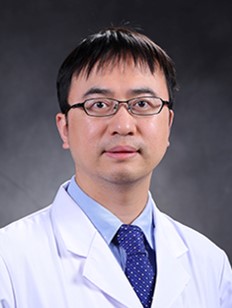
Associate Professor of Neurosurgery
Consultant Neurosurgeon
Neurosurgical Center for Stereotactic Treatment and Functional Disorders
Clinical Expertise:
E-mail:
Clinical Expertise
Functional Neurosurgery,Reconstructive neurosurgery,Peripheral nerve surgery
Nerve injury, Neuropathic pain (Trigeminal neuralgia, Spine-related pain, Headache), Paralysis, Movement disorder (Tremor, Parkinson's Disease, Dystonia), Facial nerve disorder(Facial Palsy, Hemifacial Spasm, Meige’s syndrome), Epilepsy.
Research Interests
Dr. Shu Wei focuses on reversing functional disorders caused by neurological deficits, such as pain, epilepsy, movement disorders, and motor deficits.
Background
Dr. Shu Wei was born in Yongzhou City, Hunan Province. He completed his primary and secondary education in his hometown. From 2002.09 to 2014.07, he successfully completed his undergraduate to doctoral studies at Capital Medical University, and obtained his M.D. and Ph.D. degrees. Since 2010.08, Dr. Shu has been engaged in clinical work in neurosurgery at the Functional Neurosurgery Center of Xuanwu Hospital,Capital Medical University. Specializing in functional neurosurgery, he focuses on restore neurological function and is dedicated to conducting surgical treatments for pain, epilepsy, movement disorder and paralysis.
Education
2002 — 2007 Bachelor, Capital Medical University,Clinical Medicine
2007 — 2010 Master, Capital Medical University, Surgery
2011 — 2014 M.D., Capital Medical University, Surgery
Residencies
2010 — 2015 Resident Physician of Functional Neurosurgery, Xuanwu Hospital, Capital Medical University
2015 — 2019 Attending Physician of Functional Neurosurgery, Xuanwu Hospital, Capital Medical University
Awards and honors
Advanced Individual of Xuanwu Hospital, Capital Medical University
Professional Memberships
Deputy Secretary-General of the Neuromodulation and Functional Repair Committee, China Human Health Science and Technology Promotion Association
Member of the Electroencephalography and Brain Rhythm Disorders Committee, Beijing Neuroscience Society
Corresponding Editorial Board Member of Chinese Journal of Pain Medicine
Research & Publications
1. Shu W, Yu T, Zhang G, et al. The relationship between scalp EEG spike frequency during seizure-free intervals and surgical outcomes in patients with unilateral hippocampal sclerosis temporal lobe epilepsy[J]. Pract J Med, 2012, 28(13): 2133-2135.
2. Shu W, Tao W, Hu Y, et al. Spinal cord stimulation for complex regional pain syndrome[J]. Chin J Minim Invasive Neurosurg, 2013, 18(2): 60-62.
3. Shu W, Li Y, Zhu H, et al. Application of virtual reality technology in neurosurgery education[J]. Contin Med Educ, 2016, 12(4): 35-36.
4. Shu W, Li Y, Tao W, et al. Spinal cord stimulation combined with microsurgical DREZotomy for pain due to syringomyelia[J]. Br J Neurosurg, 2016, 30(5): 585-587.
5. Shu W, Tao W, Zhu H, et al. Three-dimensional intraoperative imaging with O-arm to establish a working trajectory in percutaneous endoscopic lumbar discectomy[J]. Videosurgery Other Miniinvasive Tech, 2016, 10(4): 555-560.
6. Shu W, Li Y, Tao W, et al. Efficacy analysis of repeated microvascular decompression for hemifacial spasm[J]. Stereotact Funct Neurosurg J, 2017, 30(1): 14-17.
7. Shu W, Tao W, Hu Y, et al. Efficacy analysis of dorsal root entry zone lesioning surgery for cancer pain[J]. Stereotact Funct Neurosurg J, 2017, 30(4): 193-196.
8. Shu W, Li Y, Tao W, et al. Percutaneous endoscopic spinal surgery for L5-S1 disc herniation[J]. Chin J Clin Neurosurg, 2018, 23(1): 4-6.
9. Shu W, Hu Y, Tao W, et al. Clinical study on spinal cord stimulation for postherpetic neuralgia[J]. Chin J Clin Neurol, 2018, 26(1): 59-63.
10. Shu W, Wang H, Tao W, et al. Efficacy analysis of peripheral nerve stimulation for chronic headache[J]. Stereotact Funct Neurosurg J, 2018, 31(1): 1-4.
Any use of this site constitutes your agreement to the Terms and Conditions and Privacy Policy linked below.
A single copy of these materials may be reprinted for noncommercial personal use only. "China-INI," "chinaini.org" are trademarks of China International Neuroscience Institute.
© 2008-2021 China International Neuroscience Institute (China-INI). All rights reserved.